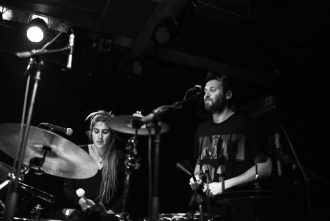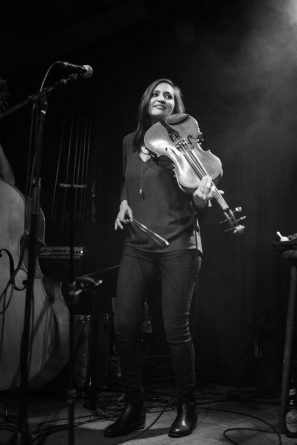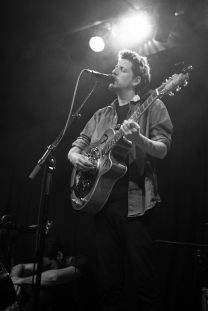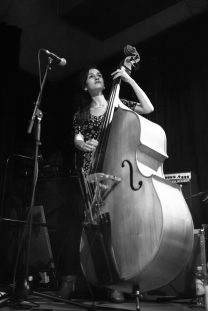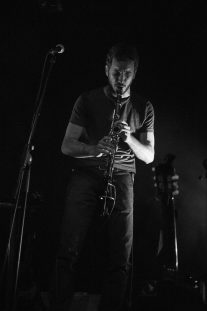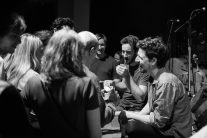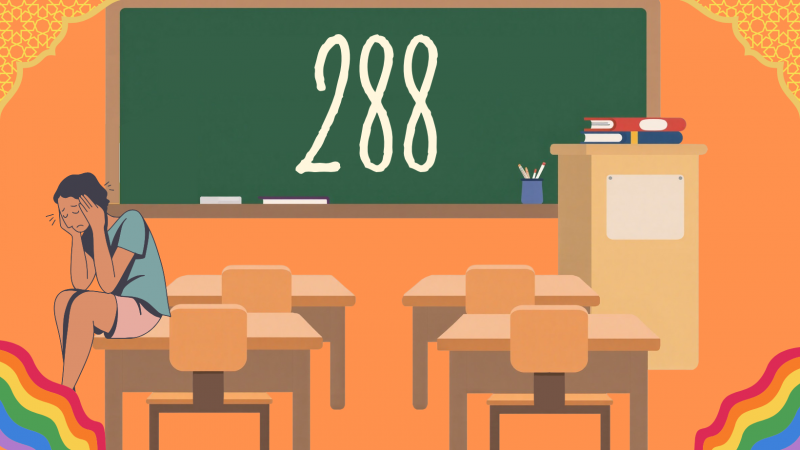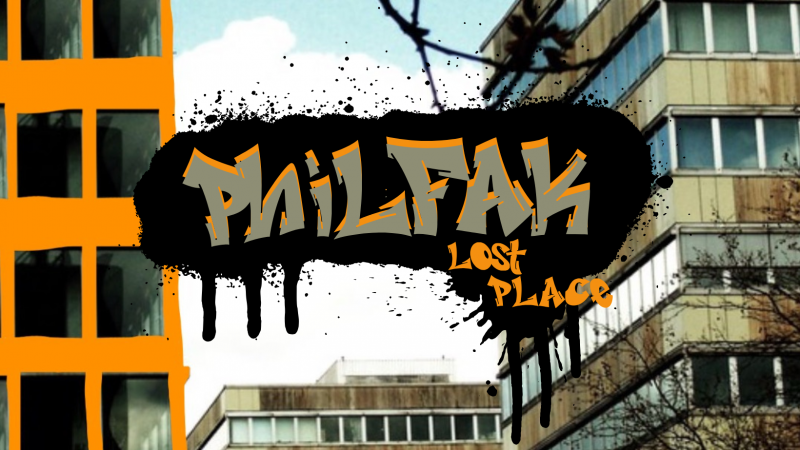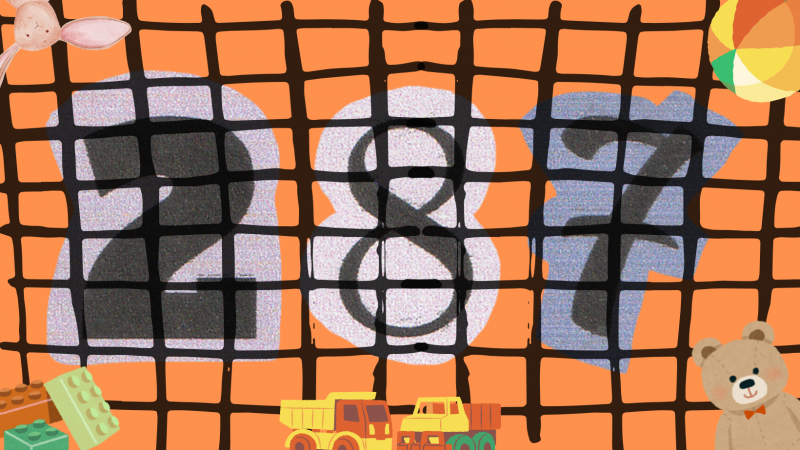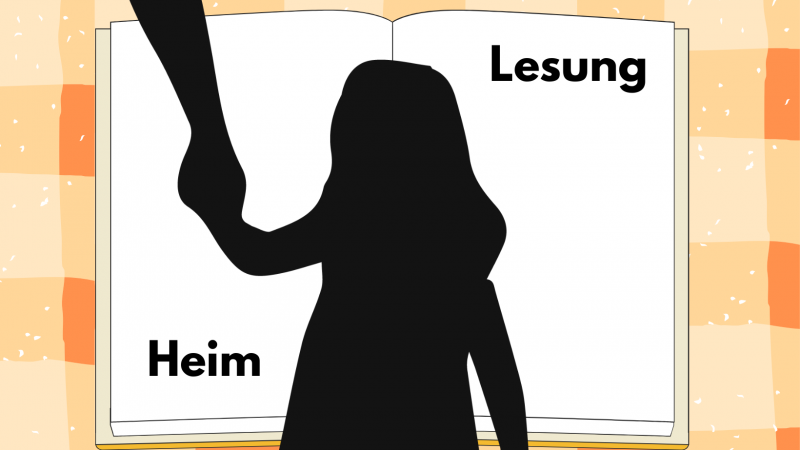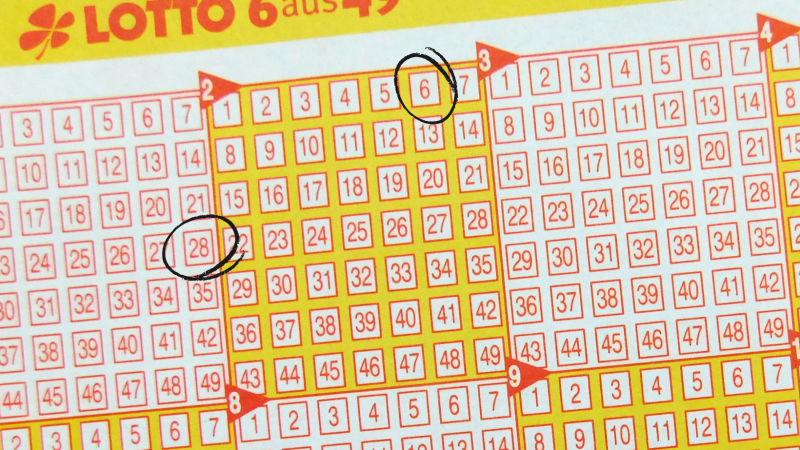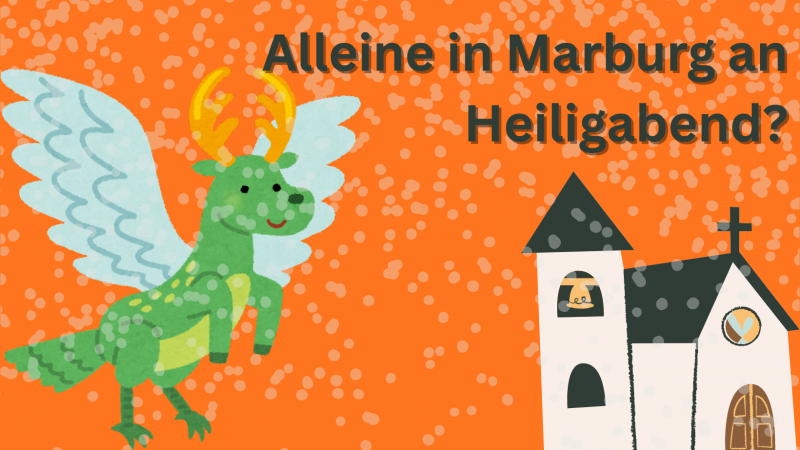TheAngelcy compare Israel to a donut
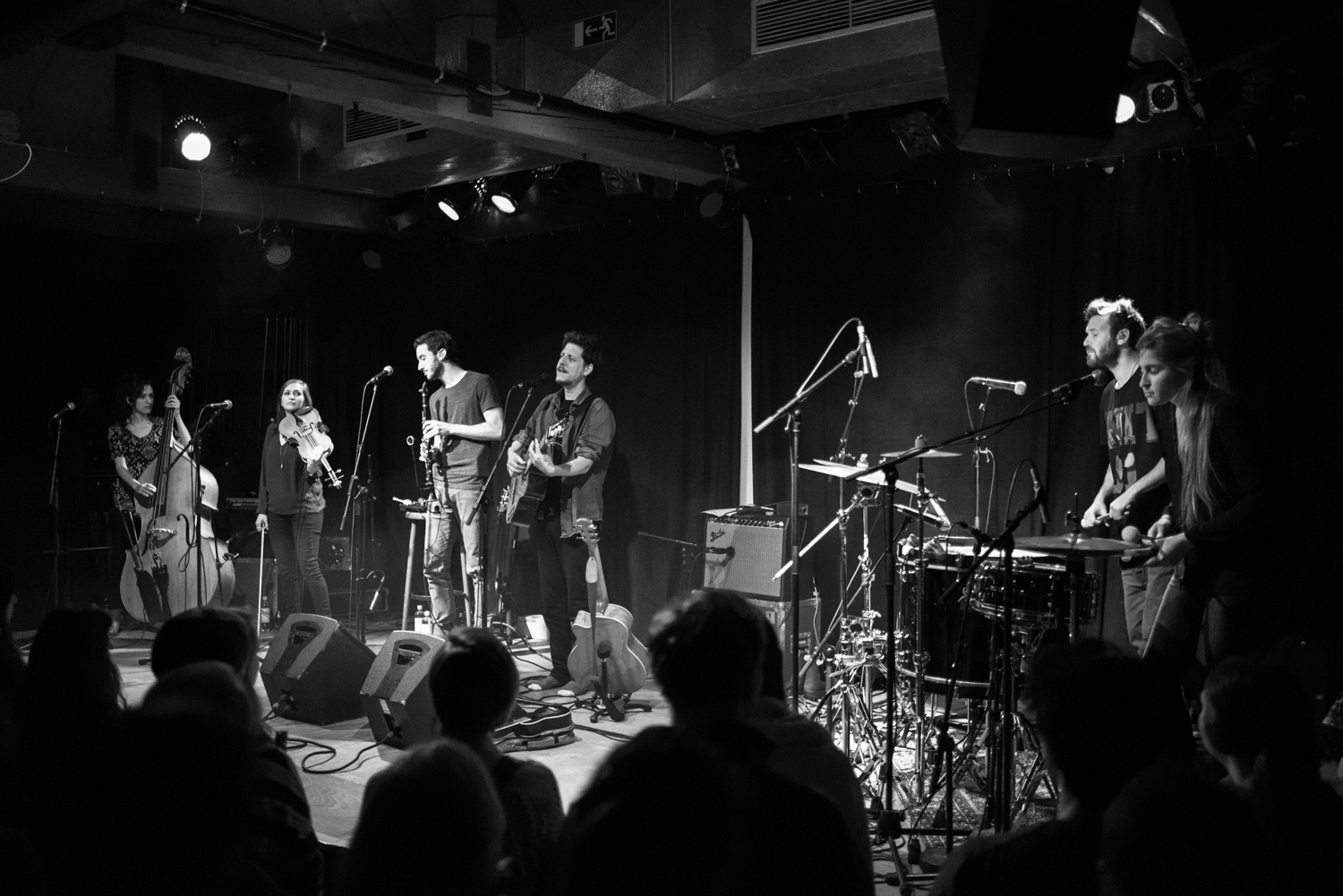
„Desperate, naive, kind of weird and maybe sensitive“ – this is how an angel should be for the agency ‚TheAngelcy‘. But in real life, the agency is a band from Israel, just been on tour around Europe. The six musicians played at the KFZ in Marburg. PHILIPP talked with the singer and guitar player Rotem Bar Or about life, Israel and his ex-girlfriend from Hamburg.
PHILIPP: It’s always kind of awkward to start an interview, so I jump right in. Listening to your music I get the feeling that you make the soundtrack to that blurry image that I – as somebody who has never been to Israel and isn’t very much into what’s going on there – have of the state of Israel. Am I right with that, first of all, and does Israeli music culture have a big impact on you?
Rotem Bar Or: Well… Israeli music culture?
Maya Lee Roman who brings her baby and a babysitter with her on tour, pushes the pram through the room. Everyone is focused on the baby.
Everyone is interested in the baby. That’s interesting now. I answer the questions. He (points at the baby) will be a singer-songwriter one day, right Maya?
Maya Lee Roman: A songer-singwriter. That’ll be a nightmare! (laugh)
Rotem: She prefers him to be a professional rapist or something like this…
Everyone laughs. We didn’t expect this rough humour. Usually the Tel Avian band stands for softer tones. Maya takes the pram to the corner of the room.
Yeah, it’s kind of a long question.
Rotem: We didn’t try to create a soundtrack to such a broad thing like Israel. It’s just a soundtrack to our life. And of course being an Israeli, it has a lot to do with the situation that you face as a young person – kind of young – living in Israel, growing up in Israel. But also, we are trying to do something more universal through that. It’s like a gate for us. Our own local experience or even our own particular experience is being human or whatever, our own heartaches, fears and excitement. We try to use it as a gate to something more universal, human.
Obviously it resonates with a lot of people outside of Israel.
Rotem: Yeah, I hope so. I think Israel has a very complex culture for such a small country. It is very heterogeneous. Because jewish people came from all over the world, from many different cultures, many different music styles and traditions and influences. And of course the local population, the Palestinians (thinks), this place. We are mixed all of that together, together being a part of the global world. We are part of the empire… I don’t know how to call it, of the West, you know? We are part of the same empire.
Maybe the western civilization? But that’s such a big word…
Rotem: But it’s true. Even how we grew up, you in Germany, me in Israel, someone else in France, most likely, half of what we had on TV, cinema, radio, it is the same.
The drummer of the band, Udi Naor, is filming the interview and joins the conversation.
Udi: And that’s even with our parents and grand-parents. My grandparents are from the Czech Republic, Bulgaria and Poland and Ukraine. And it’s a kind of Eastern-European culture.
Rotem: And my parents came from South-America, so the jewish people come from all over the world.
You are living in Tel Aviv. Is the city kind of a bubble, a peaceful place in comparison to other cities in Israel?
Udi: In a way you are right with that. But still we are very inflicted by the situation. The day we had our flight, in the morning there was a drill of the sirens of the war. People got really scared because one and a half years ago the sirens were really intensed in Tel Aviv since there was a big bombing of missiles. People are drinking café, are on Instagram- cup cakes, unicorns and everything – and then they know they get bombed.
Rotem: What TheAngelcy stands for, the values – also before the politics – is a minority in Israel for sure. But it is not only in Tel Aviv. We have a lot of audiences around Israel. But still, they are specific people. First of all, it is in English. So it’s big smart to people who are more orientated to the Western civilization and not to the Mediterranean Pop in Hebrew. It is completely different. Most of them wouldn’t know that TheAngelcy exists. In some circles we are very big, in some places we are invisible. In Tel Aviv this minority is a majority that is more liberal, secular and wants to be part of the world. In a way it’s a bubble inside of Israel. But in a way, I think, Israel is a bubble in the world and Tel Aviv is the only part which is actually not a bubble that is connected to the world.
A bubble inside of a bubble, kind of like in Inception…
Rotem: Israel is actually a donut and Tel Aviv is the whole in the middle of the donut.
Udi: I love this metaphor.
Rotem: He loves food.
Udi (murmuring): Israel is like a donut…
Okay, I don’t want to cut you short but the topic is way too huge to really dive into it. You talked about reflecting your personal experience in your music and to me it feels like, your music is very intimate. Some things you sing about, I would think about twice, before telling a friend. How can you be comfortable with that kind of vulnerability?
Rotem: I can say that some of the lyrics, it is a challenge every time to sing on the stage. I get nervous before singing them every time. But after I sang it, there’s always a different feeling in the room for me for sure. If we share only things that are correct between us, if you meet someone and you only talk correct polite things, then it’s like my representative meets your representative, we never really meet. And to make a real connection, we need to break the dishes. We need to break something, say the wrong things, but say the things that exist, even in a funny way. We need to find a way that makes it less horrible. But we have to deal with the horrible to bond. And I think it is one of the big power of a performance and art that we are allowed a little bit more than in a regular conversation with strangers. Things I could never say to strangers, I can sing them on stage. It is kind of ok, it is art. I performed this lyrics to my mother, when I wrote them. She was shocked, but after that she just said, ok it is art. We didn’t really meet.
So this is the way you express your opinion… through art?
Rotem: It is not only about opinions. It is like a part of my personality and dreams and nightmares. It is not just opinions that I have. I can sing a line very pacifistic, like nobody’s soldiers and nobody’s land. I can sing a line I am killer, I kill. I can be both in a way.
Yeah, I see. How do you write these songs?
Rotem: I don’t remember. I need to write more songs, trying to remember how to write these songs. I feel that for a song to be very good, it needs to be very surprising. It needs to surprise the writer also. Because if I had known that I can write such a song, I would have already written it. To find something new I have to break a rule that I have with myself. A rule about songs, a rule about life, a rule about thoughts, I need to break a rule. And every time I need to find a new way to break a rule, either by trauma, – she gets heartbroken or there is a war or something bad happen or something very good happened, that is also a trauma. You get shocked by something. Sometimes you don’t want to wait for a shock to come. Sometimes I try to wear my defenses out, sometimes by just playing the guitar for five hours straight until my mind becomes like a chewing gum. And then I can surprise myself, because something weird will come out of my mouth, because my system is exhausted.
Is it just you who writes the songs?
Rotem: The lyrics – until now – are just from me, I don’t know what is going to happen in the future. The music until now, the first album was like a dialogue between me and the band. I brought the basic music most of the time and some ideas for the composition. But when I make a composition alone, it is usually very flat. And these people are very, very talented and they make everything become like a space, especially Uri.
Something else: You travelled a lot around the world and now you are travelling with your band. Does the travelling has an impact on your music?
Rotem: Yes, for sure. Every experience we had influenced us. I can say that I never got back to being the same person that I have been before I went on the journey. Maybe if I had stayed in Israel for the four years I have travelled, maybe I also would have changed in a different way. It is also a kind of journey without moving. It is such a long time, you know? People change anyway. I lived in London for a year and a half, and then went back to Israel, then I went to India for a year. For Six months I’ve been a homeless musician in Germany and France.
Literally homeless?
Rotem: Yes, I was sleeping in parks, in a sleeping bag with the guitar. I did it for six months between May and November. In November it got too cold. So I got a girlfriend in Hamburg and I stayed there and then I went back to Israel. But what I am trying to say is that in this time I had one friend who was staying in Israel all the time. When I got back, I developed this traveller’s ego… I’ve been here, I’ve been there, I gathered experiences…
You’ve got them facebook pictures!
Rotem: I didn’t have a facebook-account at this time. It was about nine years ago. And that friend was the guy I recorded the first TheAngelcy tracks with. In a way that I realized that he also changed and gathered a lot of experience while just staying in one place to work. He learnt about responsibility and a lot of things that I didn’t learn. So in a way he also made the journey, while I made the journey. I don’t have something more than him, just in a different way.
What do you guys do to make ends meet or can you make a living by playing in the band?
Rotem: We had a good Euro-Tour (year round two) now in Israel. We could make a small, small living for TheAngelcy but not enough. People do other stuff in the meantime. Me, I take loans and I owe people money, basically.
Udi: It’s a good job!
Rotem: It is a good job. But we have a good following in Israel. It is very difficult to make it economically valuable and it’s still really risky. Even if we fill up the clubs, we still might lose money. We need a lot of people, because the expenses are really high for us, to come here with our instruments and everything. But I think we are in a far better situation than most Israeli bands and artists. We are very fortunate. We have good problems. We have good chances, opportunities. We’re going to see what works out. I am 36 years old, I have no savings, no expected income at all. There’s nothing. But it is a choice. I think we are rich in other ways.
Yeah, for sure. I think it’s a cliche but probably richer than anybody who works in job he doesn’t like.
Rotem: Especially as a singer-songwriter I could have gone solo and maybe make more money. But the experience of having a band and sharing is something that money can’t buy. If you pay people to play with you, it is not the same as having partners who feel that it is theirs. You have your six people who feel that it is their thing… even more people actually. It is a great atmosphere to live in. You share something that is really strong.
Yes, you create something together. Obviously freedom is probably important for you, when you make such decisions. But how do you define freedom for yourself? Because it also plays a big part in your songs.
Rotem: Wow… it is a big topic for me. I think freedom is a question, not an answer. I don’t know who I am at all. I don’t understand myself at all. I don’t even know what part of my thoughts is my own, what parts of my inputs are mine, which part of my personality I am, being moved by a lot of things. What’s freedom? Is it surrendering to that freedom or should I surrender to something else?
Well that was trippy. Let’s take a deep breath and move on.
So would you say freedom is a state of mind which is always doubting the status quo?
Rotem: I don’t even know. Maybe doubting all the time is also slavery. I don’t even know what it is that we are trying to run away from. I think freedom is a search. It is a direction, not a position.
I like that answer. It leaves some space for the imagination. If TheAngelcy really was an agency for Angels, what kind of people would you recruit for it? What are the traits of these people?
Rotem: Desperate, naive and… (ponders)
Udi: Funny!
Rotem: No, they don’t have to be funny.
Uri: I think, everyone needs to be funny. Everyone has their own kind of being funny.
Maybe you mean strangeness?
Udi: Yeah, like a strange funniness. Something that is weird.
Rotem: Maybe also very sensitive.
I get that sensitive part but why desperate and naive?
Rotem: I think you cannot make a big change without being desperate. I have to say something naive about being naive. If you lose touch with your naivety you lose touch with something that is very essential in the world, or in nature or magic. If a person doesn’t have any naivety left, it’s all about power after that. I think Jimi Hendrix said that great geniuses and artists are people who kept part of their brain childish. They didn’t let the world change them. That’s the place where the flowers grow. Otherwise it is very planned and there is no surprise, no magic, no inspiration. All of these things are very naive things in a way.
That’s quite a lot to think about.
Rotem: I am just trying to confuse people with words.
Yeah, we gonna pick out the right thoughts. Thank you for the great talk!

